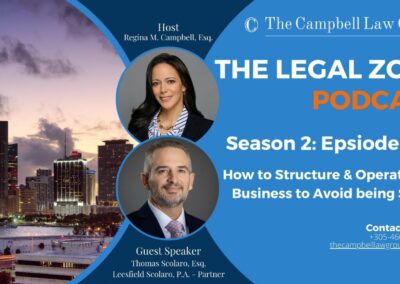Owning a business comes with numerous challenges that can significantly impact its success. Among these challenges, one of the most devastating scenarios for a business owner is a damaged reputation. A business’s goodwill is directly tied to its reputation, serving as a crucial element for future growth and success. Those who have personally experienced business defamation understand the substantial fallout it can cause, including diminished customer loyalty, substantial financial losses, and the emotional toll it can take on those involved.
What is defamation?
Defamation refers to the act of spreading false statements about a person or business with the explicit intention of harming their reputation. This complex area of law has only become more complicated with the emergence of the Internet and social media platforms. These platforms have provided the general public with a convenient forum to publish defamatory statements, should they wish to do so. As a result, former employees, customers, and even competitors can post negative comments about your business online, potentially reaching a wide audience.
Customers have the right to honestly share their experiences of your business online, on whichever platform they choose. It is a defense in a defamation claim if the relevant statement is true or reflects an honest opinion. However, if a false statement causes significant harm to your business’s reputation, you may have a valid defamation claim.
What is the difference between slander & libel?
There are two common forms of defamation, although they are often confused with one another: slander and libel. While they share the common goal of harming a business’s reputation, they differ in terms of the medium through which the false statements are communicated.
Slander
Slander of a business is a type of defamation that involves making false and defamatory statements verbally or orally. The statements are spoken to a third party, which means they are communicated through speech rather than in writing. For example, if someone spreads false rumors about a company during a conversation with others and those rumors harm the company’s reputation, it can be considered slander.
Libel
Libel, meanwhile, is a form of defamation of a business that occurs in written or printed form. It involves making false and malicious statements about an individual, group, or business intended to harm their public image or character. Examples of libel may include publishing false information about a company in a newspaper, magazine, website, false google review or social media platform.
Libel and slander are both incredibly serious for businesses and can seriously harm a company’s reputation. This can, in turn, can create a ripple effect impacting various aspects of their operations. Public perception is vital to the success of any business, and false statements can lead potential customers, partners, and stakeholders to question the company’s credibility and trustworthiness.
If you believe your business has been affected by defamation, seeking the advice of a reliable attorney can provide support and help safeguard your business.
What are some core elements of defamation?
In Florida, business defamation, like defamation involving individuals, requires the presence of certain elements to establish a valid claim. While specific elements may vary depending on the circumstances of each case, the following are some common elements of business defamation in Florida:
- False Statement: The defendant must have made a false statement about the business. It should be a statement of fact rather than a mere expression of opinion or subjective judgment.
- Publication: The false statement must have been communicated to a third party, meaning it was shared or disseminated to someone other than the business itself or the defendant.
- Harm to Reputation: The false statement must have caused harm to the business’s reputation, resulting in actual or potential damage to its standing in the community or industry.
- Negligence or Intent: Depending on the circumstances, the business may need to demonstrate that the defendant acted negligently or with intentional malice in making the false statement.
- Financial Loss: In some cases, the business may be required to show that it has suffered or is likely to suffer serious financial loss as a direct result of the defamation. This element is particularly relevant in corporate defamation cases.
- Falsity: The business must be able to prove that the statement made by the defendant is false. If the statement is true, it generally cannot be considered defamatory.
- Defamation Per Se: Certain false statements are considered inherently harmful to a business’s reputation and do not require proof of specific damages. Examples include false statements about a business’s financial solvency or criminal activities.
These elements serve as a general framework, but it is important to consult with a qualified attorney to fully understand the specific elements and requirements for a business defamation claim in Florida.
What are some examples of business defamation?
Businesses may encounter various scenarios that could potentially qualify as cases of business defamation. Here are hypothetical examples of situations that could be considered defamation under Florida law:
- Example of libel: A major industry publication publishes an article falsely alleging that a reputable Florida-based corporation’s flagship product contains harmful substances. The false statement damages the corporation’s reputation and causes a significant decline in sales and investor confidence.
- Example of slander: At a prominent trade show in Florida, a rival company spreads false rumors about a leading corporation’s unethical business practices, deliberately attempting to undermine its reputation and gain a competitive advantage. These false statements harm the corporation’s standing within the industry and potentially lead to the loss of valuable business opportunities.
- Example of defamation per se: An anonymous individual starts a social media campaign, spreading false claims that a renowned Florida-based tech company’s products are prone to frequent malfunctions and offer subpar performance. The intentional dissemination of these false statements damages the company’s reputation, resulting in customer distrust and financial losses.
Please keep in mind that these are just examples, and each actual case will vary based on its unique circumstances.
What legal recourse do Florida businesses have at their disposal?
Florida law recognizes that businesses have a reputation that can be damaged by false statements, just as individuals do. This means that businesses can be the subject of defamatory statements made by competitors, customers, employees, or others that can cause harm to their reputation.
Additionally, Florida law recognizes a cause of action for defamation of a business’s products or services, known as “product disparagement.” This occurs when false statements are made about a business’s products or services that are intended to harm the business’s reputation and result in financial loss.
In order to bring a defamation claim, the business must prove that the false statement was made with actual malice, meaning that the statement was made with the knowledge that it was false or with reckless disregard for the truth. The business must also show that the false statement caused actual harm, such as a loss of customers or revenue.
If you or your business have been the victim of defamation in Florida, legal options are available to protect your rights. These include:
- Filing a defamation lawsuit: You may be able to file a lawsuit to recover damages for the harm caused by the defamatory statements. To succeed in a defamation lawsuit, you will need to prove that the statement was false, that it was communicated to others, and that it caused harm to your reputation.
- Seeking a retraction: In some cases, it may be possible to resolve a defamation issue by requesting that the person or entity that made the false statement issue a retraction or correction.
- Working with an attorney: If you believe you have been the victim of defamation, it’s important to work with an experienced attorney who can evaluate your case and advise you on the best course of action. An attorney can help you navigate the legal system and protect your rights.
It’s important to note that not all negative statements about a business constitute defamation. Statements of opinion or fair comment are generally protected under the First Amendment and cannot form the basis of a defamation claim. Additionally, statements that are true, even if they are negative, cannot be the basis of a defamation claim.
If a business believes it has been defamed, it’s important to consult with an experienced defamation attorney who can review the facts and provide guidance on the best course of action.
Defamation is a serious issue that can have long-lasting consequences for both individuals and businesses in Florida. If you believe you have been the victim of defamation, it’s important to protect your rights and seek legal recourse if necessary.
The Importance of Temporary and Permanent Injunctions in Protecting Your Business
When it comes to safeguarding your brand and market position in the business world, temporary or permanent injunctions can be a crucial tool. In defamation cases, injunctions can prevent the publication of inaccurate, confidential, or defamatory information and even require the removal of harmful online content. Injunctions can also help protect one’s reputation and prevent further harm.
The Campbell Law Group understands the urgency of time-sensitive matters and can assist clients in obtaining injunctions to stop actions such as violation of non-competes, non-solicitation, or other detrimental actions. Our legal team has extensive experience filing and defending against injunctions in Florida and can help clients navigate the legal process to achieve the best possible outcome.
Protecting Your Reputation with the Help of The Campbell Law Group
If you or your business have been the victim of defamation, time is of the essence. The Campbell Law Group has the experience and expertise to assist you in pursuing legal action. With their expertise in defamation law, they can guide clients through the legal process and help them understand their rights and options. Whether dealing with false statements made by a competitor, a disgruntled employee, or a malicious online review, having a knowledgeable attorney on your side can make all the difference.
The Campbell Law Group’s ability to assist businesses all over Florida is also a valuable asset. Given the size and diversity of Florida’s business landscape, it’s important to have legal representation that understands the nuances of the state’s defamation laws and can navigate the local court systems. By offering their services across the state, The Campbell Law Group can help businesses and high-net-worth individuals in various industries and regions of Florida protect their reputations and seek justice for any harm caused by defamatory statements. Contact us today.
Frequently Asked Question
Can a business sue individuals or other businesses for defamation?
When false statements are made about a business, and they result in harm to its reputation, the business may have grounds to sue various parties for defamation. This includes individuals, such as former employees, disgruntled customers, or even members of the public, as well as competitors and other businesses.
Is there a time limit for filing a defamation lawsuit in Florida?
In Florida, there is a statute of limitations that sets a time limit for filing a defamation lawsuit. Generally, it is within two years from the date the defamatory statement was made or published.
What damages can a business seek in a defamation lawsuit?
A business may seek various damages in a defamation lawsuit, including compensatory damages to recover financial losses, reputational damages, punitive damages to punish the defendant, and attorney’s fees.
Can a business request a retraction or correction for defamatory statements?
A business can request a retraction or correction from the individual or entity responsible for the defamatory statements. If the request is denied or ineffective, pursuing legal action may be necessary.
Can defamation and tortious interference causes of action be brought together?
Yes. A defamatory statement, whether written or oral, can be the action or act taken which constitutes tortious interfere with a business’s interest, contracts or customers.












